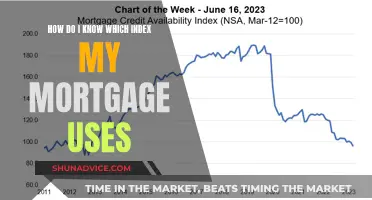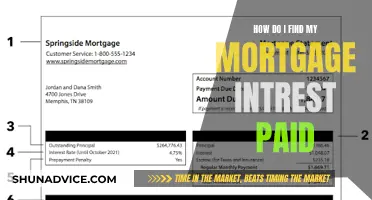
FHA loans are backed by the Federal Housing Administration, an agency under the US Department of Housing and Urban Development (HUD). FHA loans are attractive to home buyers, especially first-time buyers, as they have low down payment options and more lenient credit score requirements. To find out if your mortgage is FHA, you can look for a 13-digit HUD case number on the upper right corner of your mortgage statement.
| Characteristics | Values |
|---|---|
| Credit score requirements | Lower than other loans |
| Down payment | As low as 3.5% with a 580 FICO or 10% with a 500 FICO |
| Issuing entity | Issued by private lenders |
| Insurance | Required on all FHA loans |
| Insurer | Federal Housing Administration, an agency under the US Department of Housing and Urban Development |
| Protection | Protects owners of the mortgage against loss if you default on your loan |
| Requirements | The home must undergo an FHA appraisal and meet government standards for health and safety |
| Purpose | Helpful for buyers with limited savings or lower credit scores |
| Other costs | Closing costs, which are the fees associated with processing and securing the loan |
| HUD case number | 13-digit number on the upper right corner of the mortgage statement |
What You'll Learn

FHA loans are insured by the Federal Housing Administration
FHA loans are designed to help low- to moderate-income families attain homeownership, and they are particularly attractive to first-time homebuyers. They require a lower minimum down payment than many conventional loans and applicants may have lower credit scores than is usually required. Borrowers who qualify for an FHA loan are required to purchase mortgage insurance, with the premium payments going to the FHA.
FHA loans are available to everyone, including those who can afford conventional mortgages. However, borrowers who can afford a substantial down payment may be better off with a conventional mortgage as they can avoid the monthly mortgage insurance payments required by FHA loans.
To qualify for an FHA loan, you'll need to meet certain requirements, including an acceptable credit score and a debt-to-income ratio of less than 50%. The minimum credit score varies based on the amount of the down payment, with a score of 500 required for down payments of at least 10%, and 580 for a down payment of 3.5% to 10%. Lenders will also ask for evidence of recent and steady employment, documented by tax returns and pay stubs.
Finding Your Hamp Mortgage Servicer: Who and How?
You may want to see also

FHA loans are for buyers with low credit scores
FHA loans are an attractive option for homebuyers with low credit scores. The Federal Housing Administration (FHA) is an agency under the US Department of Housing and Urban Development (HUD). FHA loans are government-backed and insured, which means lenders are protected against loss if the borrower defaults on their loan. This insurance also means that lenders can offer competitive interest rates and be more lenient with eligibility requirements, such as credit scores.
While the minimum credit score for an FHA loan is 580, it is still possible to qualify with a lower score. A credit score of 500 is the absolute minimum to qualify for an FHA loan, but this will require a higher down payment of 10%. With a credit score of 580 or above, the down payment requirement is just 3.5%.
Rocket Mortgage®, for example, requires a minimum credit score of 580 for FHA loans. However, it is important to note that individual lenders may have their own minimum credit score requirements, which could be higher than 580.
FHA loans are a good option for homebuyers who have not saved much for their down payments. The lenient credit score requirements and competitive interest rates make FHA loans popular, especially for first-time homebuyers.
To find out if your mortgage is FHA, look for a 13-digit HUD case number on the upper right corner of your mortgage statement.
Finding Non-Recourse Mortgages: What You Need to Know
You may want to see also

FHA loans require mortgage insurance
FHA loans are insured by the Federal Housing Administration (FHA), which means that the owners of your mortgage are protected against loss if you default on your loan. In other words, FHA loans require mortgage insurance. This is a key drawback to an otherwise generous loan.
FHA mortgage insurance premiums go to the Mutual Mortgage Insurance Fund (MMIF), which the FHA uses to pay out claims to lenders looking to recoup losses. This insurance is a policy that protects lenders against losses that result from defaults on home mortgages. It is required for all borrowers, regardless of the amount of the down payment.
The FHA charges an Upfront Mortgage Insurance Premium (UFMIP), which is not refundable and costs 1.75% of the loan amount. The lender calculates the UFMIP, collects it from the borrower at closing, and then forwards it to the FHA. The UFMIP is required for the life of the loan unless the borrower meets specific requirements.
In addition to the UFMIP, borrowers with an FHA loan must also pay monthly or annual Mortgage Insurance Premiums (MIP). The cost of the annual premiums depends on the amount of the loan, the size of the down payment, and the loan term. MIP is required for the life of the loan unless the borrower meets certain requirements. If the down payment is less than 10% of the purchase price, the borrower must pay MIP for as long as they have the FHA loan. The only way to eliminate MIP is to pay off the FHA mortgage by selling the home or refinancing it with a conventional loan. However, the borrower may cancel FHA MIP after 11 years if the initial down payment was 10% or more and all payments were made on time.
Understanding Your Mortgage Grace Period: What You Need to Know
You may want to see also

FHA loans are for first-time home buyers
FHA loans are a good option for first-time home buyers for several reasons. FHA loans are backed by the Federal Housing Administration, an agency under the US Department of Housing and Urban Development (HUD). This means that FHA loans are government-insured, which protects lenders from significant losses and encourages them to make loans in their communities.
FHA loans are attractive to first-time home buyers because they have low down payment options, a lower minimum credit score requirement than most other types of home loans, and lenient credit score requirements. For example, a buyer can be considered for an FHA loan with a credit score as low as 500, although a higher credit score will yield better terms. Additionally, FHA loans allow for a 3.5% minimum down payment, whereas conventional loans often require a 20% down payment. FHA loans are also an option for those with a bankruptcy or other financial issues on their record.
FHA loans are not specifically designed for first-time home buyers, and the FHA mortgage program will not refuse a potential borrower simply because they have borrowed before, have had a mortgage in the past, or already own property. However, there are some restrictions. FHA loans are only available for the buyer's primary residence, so they cannot be used for investment properties or second homes. Additionally, the home must be appraised by an FHA-approved appraiser.
To identify if your mortgage is FHA-insured, look for a 13-digit HUD case number on the upper right-hand corner of your mortgage statement.
Is Your Mortgage Assumable? How to Find Out
You may want to see also

FHA loans are for buyers with limited savings
FHA loans are a great option for buyers with limited savings. FHA loans are insured by the Federal Housing Administration, an agency under the US Department of Housing and Urban Development (HUD). This means that FHA loans are government-backed, unlike conventional loans.
FHA loans have more lenient requirements than conventional loans, making them accessible to buyers with limited savings or lower credit scores. The minimum credit score for an FHA loan is 500, but a score of 580 or higher is preferable as it allows for a lower minimum down payment of 3.5%. If your credit score is between 500 and 579, a 10% down payment is required. FHA loans also allow borrowers to use down payment funds from sources other than their savings, such as gift money or grants.
Additionally, FHA loans have lower minimum down payment requirements compared to conventional loans, which typically require a 20% down payment. With an FHA loan, you may be able to purchase a home with a down payment as low as 3.5% if your credit score is high enough. This makes FHA loans attractive to first-time homebuyers, who often have limited savings and can benefit from the lower down payment and credit score requirements.
However, it's important to consider the costs associated with FHA loans. One significant cost is the mortgage insurance premium, which may need to be paid for the life of the loan if the down payment is less than 10%. FHA loans may also have higher interest rates and closing costs, including appraisal and origination fees.
To find out if your mortgage is an FHA loan, check your mortgage statement for a 13-digit HUD case number in the upper right-hand corner. This number indicates that your loan is through the FHA.
PNC Mortgage: Finding and Understanding Your Payoff Amount
You may want to see also
Frequently asked questions
Check the upper right-hand corner of your mortgage statement. If your loan is through the FHA, there will be a 13-digit HUD case number. HUD stands for the US Department of Housing and Urban Development, which oversees the FHA.
An FHA loan is a mortgage insured by the Federal Housing Administration, an agency under the US Department of Housing and Urban Development (HUD). FHA loans are backed by the government and are insured to protect mortgage owners against loss if you default on your loan.
FHA loans are a good option for those with a low credit score or bankruptcy in their financial history. They also allow for lower down payments than other loans, starting at 3.5% for borrowers with a credit score of 580 or higher.
You will have to pay a mortgage insurance premium on top of your loan. Additionally, FHA loans can only be used for your primary residence, not for investment properties or second homes.







